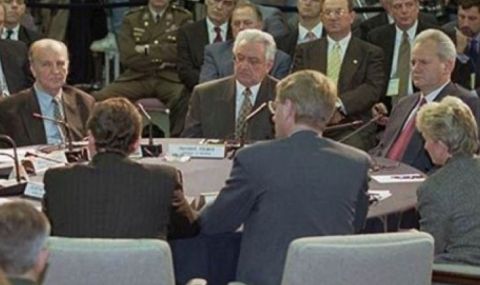The Dayton Peace Accords were signed on November 21, 1995 at Wright-Peterson Air Force Base near Dayton, Ohio. The document officially ends the four-year civil war in Bosnia and Herzegovina.
The Dayton Agreement was the result of the Dayton Conference held from November 1 to November 21, 1995. The main participants are the president of the remaining Yugoslavia, Slobodan Milosevic, the president of Croatia, Franjo Tudjman, the president of Bosnia and Herzegovina, Alija Izetbegovic, the chief negotiator from the American side, Richard Holbrooke, and General Wesley Clark. The contract was signed in the presence of Warren Christopher – the US Secretary of State .
The official agreement was signed by the three presidents on December 14, 1995. at the Elysée Palace in Paris.
Bosnia and Herzegovina's current political division and its governance structure were agreed upon collectively as part of the Dayton Agreement. According to him, Bosnia and Herzegovina is divided into two parts – Federation of Bosnia and Herzegovina (which includes territories populated mainly by Bosniaks (Bosnian Muslims) and Croats) and Republika Srpska (populated mainly by Bosnian Serbs).
The implementation of the Dayton Agreement is carried out through the UN mandate, using a NATO-led multinational force called IFOR (IFOR – Implementation Force), which includes UN forces – UNPROFOR (UN Protection Force) on 20 December 1995. After a year, these forces were transformed into ESFOR (SFOR – Stabilization Force). At the end of 2004 the command of these forces passes from NATO to the European Union.
On November 13, 2002 The Assembly of the Federal Republic of Yugoslavia ratified the Dayton Agreement, confirming that Yugoslavia had no territorial claims to Bosnia and Herzegovina.
All three main actors Franjo Tudjman, Slobodan Milosevic and Alija Izetbegovic are no longer alive.
The bloated state apparatus absorbs nearly two-thirds of Bosnia and Herzegovina's revenue. Nowhere else in Europe are there so many civil servants per capita. Posts are distributed not according to professional skills, but according to belonging to a certain ethnicity. For two decades now, the state has been the largest employer, the bureaucracy is huge, and corruption is ubiquitous. Urgent reforms are needed, but there is a lack of political will to carry them out.
